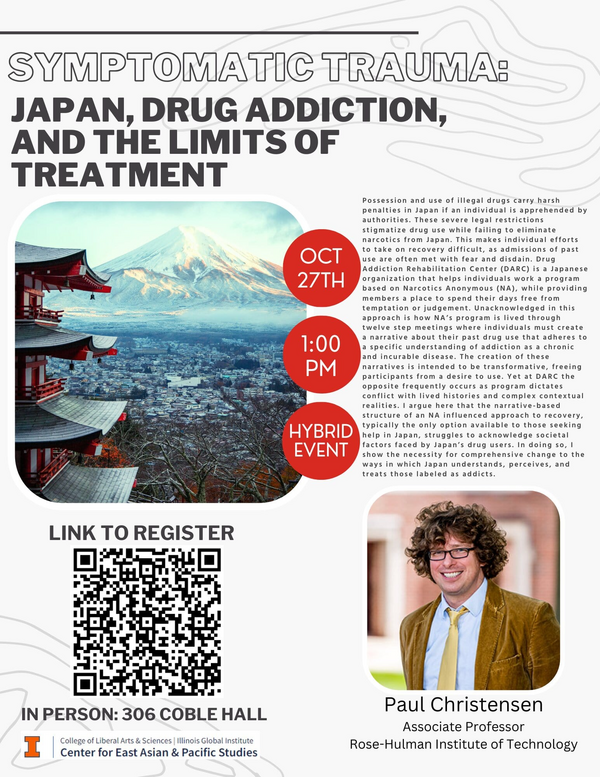
CEAPS Speaker | Paul Christensen "Symptomatic Trauma: Japan, Drug Addiction, and the Limits of Treatment"
- Event Type
- Lecture
- Sponsor
- Center for East Asian and Pacific Studies
- Location
- 306 Coble Hall (801 S. Wright Street) and Zoom
- Date
- Oct 27, 2023 1:00 - 2:30 pm
- Speaker
- Paul Christensen (Rose-Hulman Institute of Technology)
- Registration
- Registration
- Contact
- Yuchia Chang
- yuchia@illinois.edu
- Views
- 285
- Originating Calendar
- CEAPS Events Calendar
Abstract: Possession and use of illegal drugs carry harsh penalties in Japan if an individual is apprehended by authorities. These severe legal restrictions stigmatize drug use while failing to eliminate narcotics from Japan. This makes individual efforts to take on recovery difficult, as admissions of past use are often met with fear and disdain. Drug Addiction Rehabilitation Center (DARC) is a Japanese organization that helps individuals work a program based on Narcotics Anonymous (NA), while providing members a place to spend their days free from temptation or judgement. Unacknowledged in this approach is how NA’s program is lived through twelve step meetings where individuals must create a narrative about their past drug use that adheres to a specific understanding of addiction as a chronic and incurable disease. The creation of these narratives is intended to be transformative, freeing participants from a desire to use. Yet at DARC the opposite frequently occurs as program dictates conflict with lived histories and complex contextual realities. I argue here that the narrative-based structure of an NA influenced approach to recovery, typically the only option available to those seeking help in Japan, struggles to acknowledge societal factors faced by Japan’s drug users. In doing so, I show the necessity for comprehensive change to the ways in which Japan understands, perceives, and treats those labeled as addicts.
Bio: I’m Paul Christensen, a cultural anthropologist and Associate Professor in the Humanities, Social Sciences, and the Arts department at Rose-Hulman Institute of Technology in Terre Haute, Indiana. Much of my past research and publications have focused on addiction and recovery in Japan. This has included ethnographic fieldwork with Danshūkai, Alcoholics Anonymous, and the Drug Addiction Recovery Group in Tokyo. Recently I started a new ethnographic project in Tokyo that broadly considers how people conceptualize and imagine the future. I did my Ph.D. at the University of Hawai‘i at Mānoa and now live in Indiana with my wife, Ana, an oceanographer working remotely far from the nearest ocean, and our two sons.